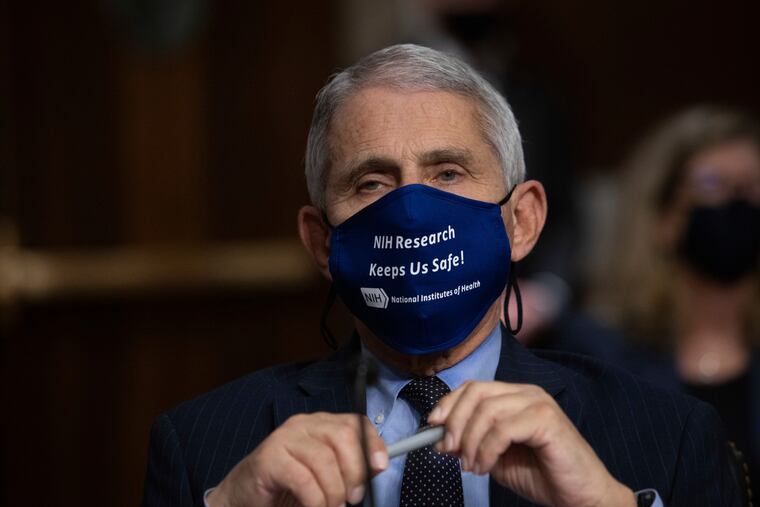Fauci ‘absolutely not’ surprised by Trump’s COVID-19 diagnosis: ‘I was worried that he was going to get sick’
In a "60 Minutes" interview, Fauci also discussed being restricted from doing interviews, his frustration with the Trump campaign over a political ad, and the threats his family has endured.

In a striking interview on “60 Minutes” on Sunday, Anthony Fauci, the nation’s top infectious-disease expert, said he was “absolutely not” surprised President Donald Trump contracted the novel coronavirus after watching him flout public health guidelines at a White House event last month.
The president and more than a dozen other people who had close contact with him in late September — including many maskless attendees at a Sept. 26 Rose Garden event honoring Supreme Court nominee Amy Coney Barrett — tested positive for the novel coronavirus earlier this month.
When asked by CBS News chief medical correspondent Jon LaPook if Trump’s COVID-19 diagnosis surprised him, Fauci answered, “Absolutely not.”
"I was worried that he was going to get sick when I saw him in a completely precarious situation of crowded, no separation between people, and almost nobody wearing a mask," Fauci said Sunday. "When I saw that on TV, I said, 'Oh my goodness. Nothing good can come out of that, that's got to be a problem.' And then sure enough, it turned out to be a superspreader event."
In the interview, Fauci discussed being restricted from doing interviews, his frustration with the Trump campaign over a political ad, and the threats his family has endured since he became the face of the public health response to the coronavirus pandemic.
» READ MORE: White women are ditching Trump, and it could cost him Pennsylvania
Fauci, who has been one of the most trusted voices on the coronavirus pandemic, has clashed with the president and others in the White House on multiple occasions. The director of the National Institute of Allergy and Infectious Diseases has long advised that Americans wear masks in public when they cannot maintain at least six feet of social distancing. Trump has often spurned mask-wearing. Fauci said Trump's campaign rallies, which often attract mask-free crowds, are "asking for trouble" amid the pandemic. Trump swiped back at Fauci last week, referencing the infectious-disease specialist's errant ceremonial first pitch at a Washington Nationals game over the summer: "Tony's pitching arm is far more accurate than his prognostications."
Fauci clashed with Trump last week after his campaign team irritated the doctor by quoting him out of context in an ad supporting the president's reelection campaign.
"I do not, and nor will I ever, publicly endorse any political candidate," Fauci said on "60 Minutes." "And here I am, they're sticking me right in the middle of a campaign ad, which I thought was outrageous."
The White House did not immediately respond to a request for comment on the "60 Minutes" interview. Trump campaign spokesman Tim Murtaugh defended the ad last week, saying: "The words spoken are accurate, and directly from Dr. Fauci's mouth."
Fauci also confirmed long-standing suspicions that the White House had restricted his availability to journalists to control flow the information coming from the administration's coronavirus task force.
"During this pandemic, has the White House been controlling when you can speak with the media?" LaPook asked on Sunday's show.
"I think you'd have to be honest and say yes," Fauci answered. "I certainly have not been allowed to go on many, many, many shows that have asked for me."
» READ MORE: COVID-19 cases are rising fast in Pa. and NJ., but hospitals are not burdened — yet. Here’s why.
Fauci also said he and his family have been dogged by threats and harassment since he began giving public health advice that has been sometimes at odds with the president's political agenda. He said he power walks with a security detail after receiving "real and credible threats." His wife and children have also been harassed, he said.
"That's sad, the very fact that a public health message to save lives triggers such venom and animosity to me that it results in real and credible threats to my life and my safety," he said Sunday. "But it bothers me less than the hassling of my wife and my children."
The Washington Post’s Antonia Noori Farzan contributed to this report.